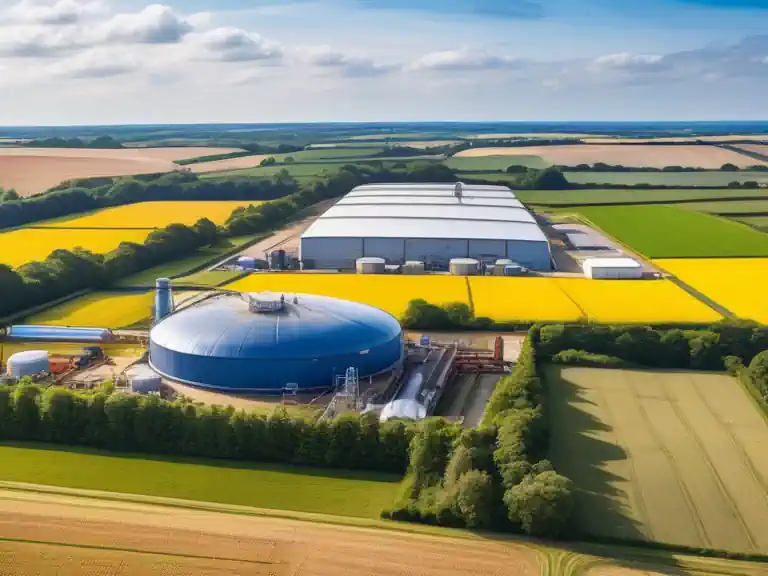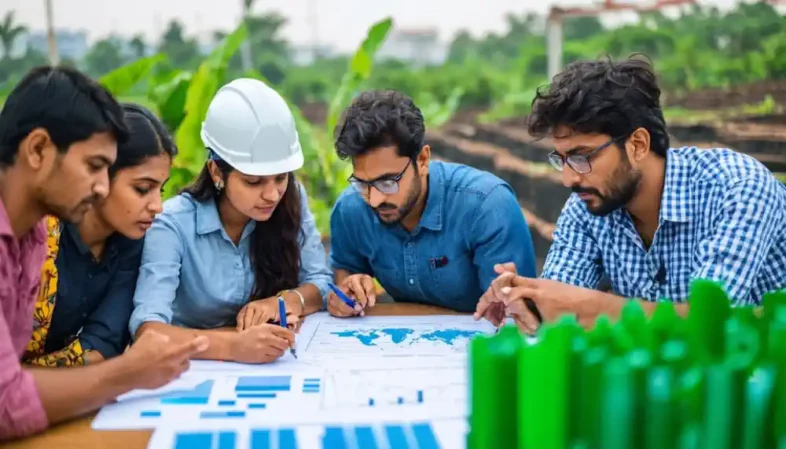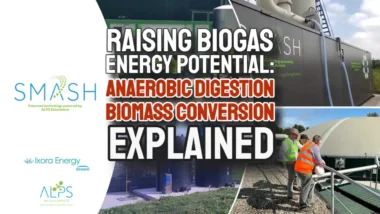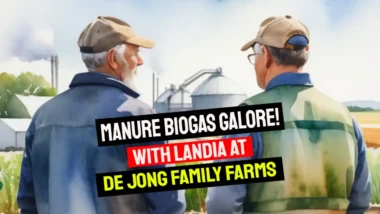The new Global Biofuels Alliance is poised to place India at the heart of the G20 nations for developing biogas digestion capacity and in this way also they will become leaders in the field of purified biogas biomethane development.
Seeking renewable energy sources has become critical in the global effort to combat climate change. The Global Biofuels Alliance, led by India, aims to revolutionise the biofuel sector. 1 This article will show how this alliance places India at the forefront of Asia's biogas and biomethane development. 3
The European nations have rolled out their massive biofuels development plans (known as REPowerEU) in recent years, and similarly, the US has followed suit under President Biden, but that will be “small-fry” compared to this! Keep reading to discover more about this exciting initiative. 2
The Global Biofuels Alliance (GBA)
The Global Biofuels Alliance (GBA) is a big deal in the green energy world. It aims to push countries and businesses to use more green fuels, like biogas and biomethane, helping our planet breathe easier.

Background and Objectives
India launched the Global Biofuels Alliance on 9th September 2023, with high-level support from countries like Singapore, Bangladesh, Italy, USA, Brazil, Argentina, Mauritius, and UAE. 1 This major event took place at the G20 Summit in New Delhi. India's leadership aimed to push for a faster adoption of biofuels worldwide. They plan to do this through better technology and smart use of resources.
The alliance will serve as a centre of excellence for sharing knowledge and expertise.
The main goal is clear: speed up the use of biofuels across the globe to tackle energy needs in cleaner ways. With India at the helm as G20 Chair, this move puts them in a vital position to influence how countries develop their fuel sources from biomass like plants or waste instead of oil or coal.
Experts from various fields will come together under this alliance. They'll work on making laws that support biofuel use and help figure out best practices that can work across different nations.
Sharing success stories is key so everyone can learn what works well. 2
Global Biofuels Alliance (GBA's) Key Initiatives
GBA is making moves with training, helping countries with their biofuel projects, sharing policy ideas, setting rules, and joining forces worldwide. Hungry for more? Keep reading to learn how they're doing it all.
1. Capacity-building exercises
The Global Biofuels Alliance boosts biofuel development through targeted capacity-building exercises. These exercises ensure countries can meet global standards for sustainable biofuel production. 3
A few of the main actions are set out below:
- Organising workshops that bring together experts from the Asian Development Bank, UN Energy for All, and the International Renewable Energy Agency. These sessions focus on best practices in bioethanol and biodiesel production, offering vital insights into successful projects.
- Providing technical support to nations by sharing knowledge on advanced technologies such as algae-based fuel production and biogas plants. This helps countries innovate beyond traditional crop cultivation methods. 4
- Launching online training courses in partnership with entities like the World Biogas Association and the International Energy Agency. Courses cover net zero emission strategies, sustainable crop management to mitigate ILUC (Indirect Land Use Change), and renewable diesel integration.
- Facilitating policy development forums with members of the World Economic Forum and the Biofutures Platform to promote policies that balance food production with energy needs, addressing the food versus fuel debate.
- Encouraging global collaboration through a knowledge repository that includes case studies of successful biofuel projects around the world, contributed by countries and international organisations involved in GBA.
- Advocating for sustainable finance solutions by connecting member countries with financial institutions like the World Bank for support in transitioning to greener fuels.
- Establishing standards and regulations specifically for Asian markets, considering local environmental, social, and economic contexts to foster the adoption of biofuels including biogas upgraded to biomethane in India's transport and electricity generation sectors.
These actions directly contribute to decarbonising efforts while bolstering India’s position in global renewable fuel markets.
2. Technical support for national programs
The Global Biofuels Alliance GBA provides crucial help to countries. It aids them in building strong biofuel programmes. Let's explore how this support works.
- Offers expert advice– Countries get guidance on developing sustainable biofuel sources. This includes crops like sugarcane, which are key for biofuel. 1
- Enhances skills – Training sessions improve the abilities of local teams. They learn about new biofuel technologies and methods.
- Shares success stories – Nations learn from each other's successes in biofuels production. For example, lessons from India’s push for biogas help others.
- Sets clear standards– The alliance helps create uniform rules for making and using biofuels. This makes trade easier among countries. 3
- Connects with technology providers– Countries find the right tools and machines for turning crops into fuel.
- Plans biofuel use in transport– Support includes advice on using biofuels in cars, buses, and even aeroplanes by groups like the International Civil Aviation Organization.
- Boosts energy security– By pushing for home-grown fuel sources, nations rely less on imported oil and gas.
- Tackles climate change – Programmes focus on fuels that cut down CO2 emissions, aiding goals like net-zero missions.
- Helps protect nature – Advice is given to growing fuel crops without harming forests or wetlands.
Next, we will examine how GBA encourages sharing policy lessons between countries to boost the global shift to sustainable fuels.
3. Promotion of policy lessons-sharing
After giving technical support for national programmes, sharing policy lessons stands as our next step. This process makes sure we learn from each other's successes and challenges. Here's how it unfolds:
- Foster global collaboration by acting as a central hub of knowledge. Entities like the World Biogas Association bring together experts to share insights. 2
- Work alongside international agencies such as UNIDO, ensuring shared goals align with sustainable biofuel advancements.
- Draw on the IEA's policy insight paper, guiding our actions with researched strategies.
- Propose an action plan that includes a governance framework within six months, setting clear rules for cooperation.
- Host capacity-building exercises, where countries share success stories on using biogas and biomethane more efficiently.
- Offer examples from India's progress in biofuels to inspire other countries looking to develop similar programmes. 5
- Implement standards and regulations that support the use of sustainable biofuels, ensuring everyone understands how to move forward safely and effectively.
- Create a repository where every member can access documents, research findings, and case studies about biofuel projects around the world.
- Encourage discussions on environmental sustainability through platforms like the Environmental, Social and Corporate Governance (ESG) framework to integrate social responsibility into business practices related to biofuels.
- Promote technologies like blockchain for tracing biofuel production and usage, ensuring transparency in the energy transition journey.
Through these steps, policy lessons-sharing enables countries to navigate the switch to sustainable fuels with confidence and clarity.
4. Development, adoption, and implementation of standards and regulations
Sharing policy lessons sets the stage for the Global Biofuels Alliance (GBA) to focus on standards and regulations. This is vital for biofuels' success worldwide, especially in the biogas and biomethane sectors. Here’s what this involves:
- GBA will establish clear standards for biofuel production. This ensures all countries produce high-quality fuels that are safe for vehicles.
- Members will adopt these standards, making international trade easier. Countries know they're getting a reliable product.
- Implementation across member states includes training on these new rules. Workshops and webinars will provide this education.
- Regular updates keep standards current with technological advances. As innovations like green hydrogen emerge, GBA updates its guidelines. 4
- Setting carbon footprint benchmarks helps track progress towards Net Zero emissions goals. These measures show how much cleaner biofuels are than fossil fuels.
- Collaboration with major organisations like the World LPG Organisation ensures broad support for these standards. 3
- Creating a knowledge base lets members share successes and challenges in applying these rules.
Through setting and following strict guidelines, the GBA aims to make biofuels a key player in the global energy market, allowing India to lead in Asia's clean energy future.
5. Knowledge repository and global collaboration
The Global Biofuels Alliance (GBA) stands as a central hub of knowledge, partnering with 12 top international bodies like the World Bank and Asian Development Bank. 2 It provides all countries with a platform to join forces in pushing biofuel use forward.
The alliance works closely with these organisations to share insights and support sustainable growth in the biogas field. Through collaboration, they aim to smooth the path for energy transitions using renewables.
GBA's efforts ensure members have access to cutting-edge information and best practices in bioenergy. With technical support on tap, countries can enhance their national programmes effectively.
This collective push helps secure a green future by decarbonising transport through alternatives like biogas and biomethane, crucial for clean air and reducing reliance on fossils. 3
Together, we are stronger in our journey towards sustainable energy solutions.

A crucial aspect of the utilisation of waste-based biofuels is the purity of the organic material fed into biofuel production processes. Although not identified within the programme so far is the need to avoid microplastic creation with its serious consequences for the environment. Drycake Twister Depackaging technology has recently been developed for this purpose and is active in India.
Benefits of the Global Biofuels Alliance GBA for India
Joining the Global Biofuels Alliance can make India a strong player in global green fuel markets. It opens doors for Indian companies to sell abroad and speeds up India's biofuel plans.
This move will place India at the forefront of Asia's biogas and biomethane growth, promising exciting times ahead for all involved.
Strengthening India's global position
India's move to embrace E20 fuel by 2025 marks a significant leap in its global stance. This shift aims at slashing the nation’s hefty oil import bill by around Rs 45,000 crore and intends to reduce oil needs by 63 million tonnes annually. 6 Such steps firmly place India as a frontrunner in sustainable development and eco-friendly energy sources.
Moreover, joining the Global Biofuels Alliance enhances India’s leadership in Asian biogas and biomethane markets. 3 With support from 24 countries and 12 international organisations like the International Energy Forum and World Bank, India is set to play a pivotal role.
This collaboration puts it at the centre of discussions on decarbonising transport through biofuels, aligning with broader goals like the reduction of greenhouse gases and the promotion of renewable resources across continents.
Export opportunities for Indian industries
India, now the world's third-largest ethanol producer and consumer, faces a golden chance to boost its industries globally. 7 With biofuel demand set to rise by 38 billion litres in the next five years, Indian companies have vast export opportunities.
These prospects are particularly bright in Asian markets eager for biogas and biomethane, segments where India can leverage its growing expertise. The National Policy on Biofuels aims for ethanol blending at 20% by 2030—and biodiesel at 5%.
This drive towards higher blend rates meets domestic goals and positions Indian firms favourably in international biofuel trade. 7
Biogas development is both a local solution and a global opportunity.
The stage is set for an accelerated entry into new markets. By increasing production capacities and embracing sustainable practices, Indian industries could lead in supplying eco-friendly fuel alternatives worldwide.
Collaboration with GBA members opens doors to sharing technology and best practices, further enhancing India's competitiveness abroad. 3 Next: GBA Membership increases these prospects through global collaboration.
Acceleration of existing biofuels programs
GBA will boost India's current biofuel production efforts including biogas from anaerobic digestion, like PM-JIVAN Yojna, SATAT, and GOBARdhan scheme. This move makes sure these programmes grow faster.
For example, the ethanol market reached USD 99.06 billion in 2022. 4 Thanks to Net Zero targets, biofuels could grow 3.5-5 times by 2050. 4
This step is key for India's biofuel strategy. With GBA's help, programmes get more resources and knowledge. This ensures more clean fuel replaces petrol in vehicles and makes farming eco-friendlier.
Biofuels turning into a bigger part of energy says a lot about our future with cleaner air and less carbon dioxide in the sky. 8
Global Biofuels Alliance (GBA) Membership
Countries and world bodies are part of the GBA team. They will work together, sharing goals and plans for cleaner energy.
Countries and international organizations involved
The formation of the Global Biofuels Alliance (GBA) marks a pivotal moment for the biogas and biomethane sectors, especially within Asia, with India positioned as a key player. 2 The alliance boasts participation from a diverse array of countries and international organisations, each bringing unique strengths and perspectives to the table. This collaboration underlines the growing global commitment to renewable energy sources and the critical role of biofuels in achieving sustainability targets.
| Global Biofuels Alliance (GBA) Signatory Countries | Paticipating International Organisations |
| Argentina, Brazil, Canada, India, Italy, Japan, South Africa, USA | Asian Development Bank, World Economic Forum |
| Bangladesh, Mauritius, Singapore, UAE | World LPG Organisation, UN Energy for All |
| UNIDO, Biofutures Platform | |
| International Civil Aviation Organisation, International Energy Agency | |
| International Energy Forum, International Renewable Energy Agency | |
| World Biogas Association, World Bank |
This broad coalition of G20 and invitee countries alongside notable international bodies underscores a united front in the push for biofuel advancements.
Specifically, India's role is magnified within this alliance, opening avenues for leadership in biogas and biomethane technologies. The strategic involvement of countries and organisations paves the way for enhanced collaboration, knowledge exchange, and policy development, all of which are critical for the biofuels industry's future. 3
The Global Biofuels Alliance GBA serves as a prime example of global cooperation, fostering advancements in biofuel technology and sustainability efforts worldwide.
Through this alliance, member countries, including India, stand to gain significantly, benefiting from shared expertise, increased export opportunities, and strengthened global positions in the renewable energy landscape.
Conclusion for the Global Biofuels Alliance (GBA)
India stands ready to take a leading role in the Asian biogas and biomethane sectors, thanks to the Global Biofuels Alliance. With 24 countries and 12 key international groups joining hands, this initiative marks a big step for India's energy and agricultural future.
By pushing biofuels forward, India strengthens its global stance and opens new doors for trade and innovation. This alliance promises job creation, boosts farmers' income, and moves us closer to cleaner energy use.
Indeed, the path ahead looks bright for India at the forefront of sustainable fuel development across Asia.
Global Biofuels Alliance (GBA) References:
- ^ https://www.worldbiogasassociation.org/launch-of-the-global-biofuels-alliance-gba-of-which-wba-is-a-founder-member/
- ^ https://biofutureplatform.org/news/launch-of-global-biofuels-alliance/
- ^ https://mopng.gov.in/en/page/68
- ^ https://pib.gov.in/PressReleaseIframePage.aspx?PRID=1955836
- ^ https://www.reuters.com/business/energy/india-makes-clean-energy-push-g20-with-global-biofuel-alliance-2023-09-09/
- ^ https://m.economictimes.com/industry/energy/oil-gas/global-biofuels-alliance-to-strengthen-indias-position-globally-minister-hardeep-puri/articleshow/103571398.cms
- ^ https://www.iea.org/commentaries/india-could-triple-its-biofuel-use-and-accelerate-global-deployment
- ^ https://m.economictimes.com/news/international/uae/global-biofuels-alliance-accelerating-sustainable-energy-transition/articleshow/104129888.cms






